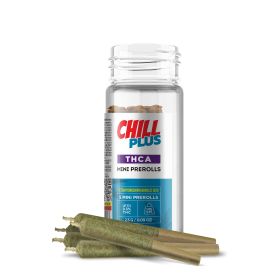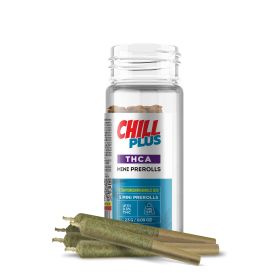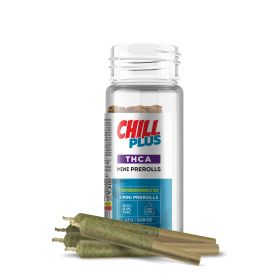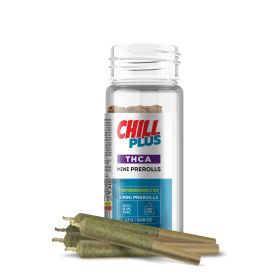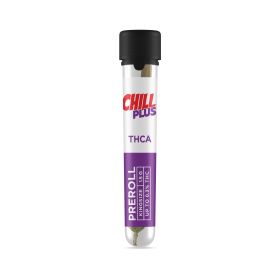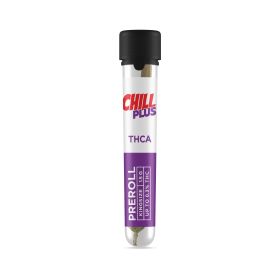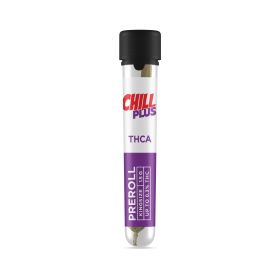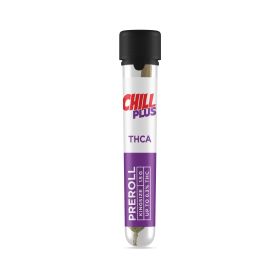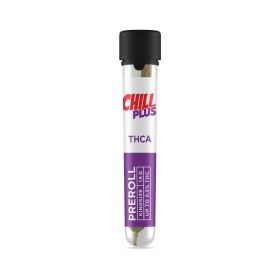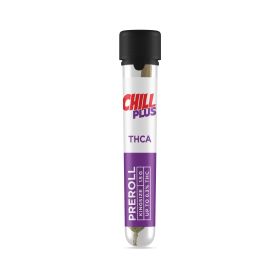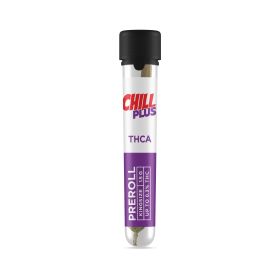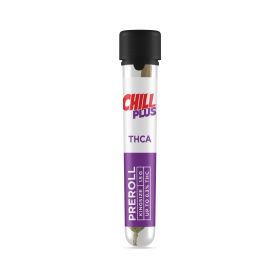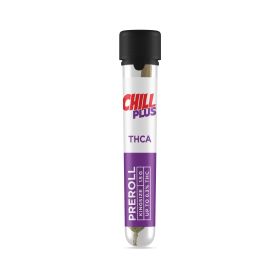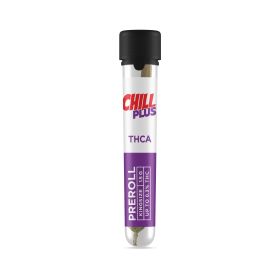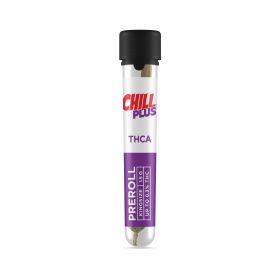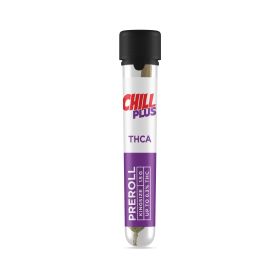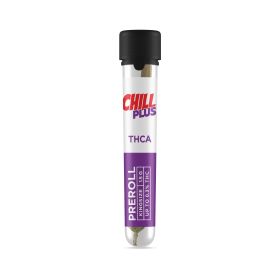THCA Products (Pre-Roll, Hybrid)
Customer Reviews
There are no reviews yet. Be the first to write a review!
Common Questions
THCA Products - Where the Journey Begins
For those who recognize the many benefits of cannabis, THC is likely a familiar term - the celebrated psychoactive component found in the plant.
You may have also encountered lesser-known cannabinoids like delta 8 or THCP. But if you think you're well-versed in the latest advancements in hemp, think again. Enter THCA, a compound that has yet to take center stage, especially when compared to its more mature cousin, THC. So, let's delve into the world of THCA products.
THCA Explained
THCA, short for tetrahydrocannabinolic acid, acts as a kind of precursor to THC. This cannabinoid acid resides within the fresh cannabis plant.
As cannabis plants grow, various cannabinoids emerge, each resembling a distinct note in a symphony determined by the specific strain. Most of these cannabinoids initially exist as carboxylic acids, including THCA. Eventually, they transform into non-acidic forms through a process known as decarboxylation or "decarbing." The acidic version of each cannabinoid typically ushers in unique effects compared to its decarboxylated counterpart.
Think of CBGA, also known as the mother cannabinoid, as the original composer of the symphony, laying the foundation for the music. It eventually breaks down to give rise to primary cannabinoids such as THCA and CBDA.
There are a handful of other cannabinoid acids that might not be common topics of discussion:
- CBCA (Cannabichromenenic acid)
- CBGVA (Cannabigerovarinic acid)
- THCVA (Tetrahydrocanabivarinic acid)
- CBDVA (Cannabidivarinic acid)
- CBCVA (Cannabichromevarinic acid)
THCA stands apart from THC in a crucial way. Unlike THC, it doesn't induce the well-known "high" sensation when ingested. This difference lies in its chemical structure, featuring an additional molecular carboxyl ring that prevents it from locking onto the brain's receptors responsible for generating that sense of being "high."
You might be wondering, "So, what's the point of THCA if it doesn't produce a high?" However, it's essential to recognize that without THCA, the existence of THC and the numerous health benefits attributed to it would not be possible.
To illustrate, imagine the process of making wine. Although grapes themselves are non-alcoholic, once crushed and fermented, grape juice becomes alcoholic wine. While they may start as two completely different things, grape becomes wine after a series of chemical reactions. The same is true for THCA.
THCA vs. THC: A Clash of Cousins
The primary difference between THCA and THC lies in the fact that THCA doesn't deliver the same "high" that THC is known for. However, to convert THCA into THC, a little heat is required.
This transformation can be achieved through methods like smoking, vaping, dabbing, or cooking. This process involves altering the structure of THCA by eliminating a specific component known as a carboxyl ring. This alteration allows THC to interact with the CB1 receptors in our bodies, leading to the sensation of being "high."
When comparing the effects of THCA and THC, there are some similarities. Both can help alleviate nausea. However, THCA appears to be particularly effective in addressing inflammation. Conversely, since THCA doesn't induce a high, its effectiveness as a sleep aid might not be as pronounced as that of THC.
The Transformation from THCA to THC
To convert THCA into THC, heat and light are essential. This process is known as "decarboxylation." Essentially, a portion of the THCA molecule undergoes a transformation, giving birth to THC.
The unique structure of THC allows it to fit snugly into the CB1 receptors in our body's endocannabinoid system, resulting in the well-known high. However, THCA doesn't fit into these receptors as perfectly, explaining why it doesn't produce the same elevated sensation.
When people smoke, vape, or cook cannabis, they apply heat. By the time cannabis enters your system, most of the THCA has already converted into THC. This means that smoking a substance rich in THCA doesn't necessarily result in more THCA entering your system; instead, it mostly becomes THC. This is why specific methods of using cannabis, such as creating extracts or consuming it without applying heat, are necessary to preserve THCA and prevent its transformation into THC.
The Potential of THCA Products: Prospective Benefits & Effects
Raw, untreated cannabis won't provide the familiar high; it requires the application of heat through decarboxylation to achieve that. However, you can still access some of the advantages associated with THC by consuming raw cannabis that retains its THCA content. For instance, you can juice raw cannabis or use products like tinctures or edibles based on THCA to harness the benefits without the high.
While individual experiences offer anecdotal evidence of THCA's effects, its molecular structure hampers its ability to bind effectively with the CB receptors in our body's endocannabinoid system.
Although there isn't enough data to confirm that THCA offers pain relief in the same manner as THC, it does interact with our receptors, albeit indirectly. Some studies suggest that THCA might have potential neuroprotective properties, which could help slow down or prevent neurodegenerative diseases like Huntington's disease. It has also been considered as a potential treatment for conditions such as colitis and irritable bowel syndrome (IBS). Early findings even suggest that THCA could be beneficial in managing seizure disorders.
The potential health benefits associated with consuming THCA include:
- Reduction of inflammation
- Alleviation of nausea and improvement of appetite
One of the significant advantages of THCA lies in the fact that all these effects can be experienced without inducing a high.
Quality Over Quantity: Assessing THCA Levels vs. THC Levels
The concentration of THCA and THC in a cannabis product is crucial in understanding its potency and the type of experience it offers.
While a high THC number may seem enticing, excessive heat during consumption can lead to the loss of some cannabinoids, leaving you wanting more.
Unless you're specifically interested in edibles, it's wiser to focus on higher THCA levels rather than simply chasing higher THC numbers. THCA indicates the true potential strength of what you're about to smoke, dab, or vape because it eventually transforms into THC. For products like flower, vape cartridges, or concentrates, it's advisable to check the THCA level. These products require heat to function optimally and deliver the desired experience.
Harnessing the Potential of THCA
Many cannabis enthusiasts and patients have incorporated THCA, once converted into THC, into their daily routines. They achieve this through methods like smoking, dabbing, vaping, or consuming various forms of cannabis to either experience the high or manage their symptoms. In such scenarios, THCA serves as a gateway to access the benefits of THC. However, an increasing number of brands are recognizing the unique advantages of unaltered THCA.
One convenient and accessible way to utilize THCA is by consuming raw cannabis. This could involve directly consuming it or incorporating it into a juicing regimen for enhanced effectiveness.
THCA and Drug Testing: A Closer Examination
It's worth noting that both THC and THCA can yield positive results on a drug test. When smoking or dabbing, not all of the THCA present converts into THC through decarboxylation. Consequently, you might be absorbing THCA alongside THC. This scenario particularly applies to specific types of products like rosin- or hash-based gummies, where complete isolation of cannabinoids might not be achieved. However, due to mandatory lab testing procedures, the likelihood of this happening has been minimized.
The Conclusion on THCA
As a precursor to THC, THCA has gradually gained attention within the cannabis community. Although it doesn't provide the trademark "high" associated with THC, THCA shares many potential health benefits with its psychoactive counterpart. This makes it an attractive option for individuals seeking relief from issues such as nausea and appetite loss, all without the accompanying buzz.
Furthermore, THCA can transform into THC through the process of decarboxylation, where the compound undergoes a metamorphosis under the influence of heat.
Eager to explore THCA? Why not give it a try today!
